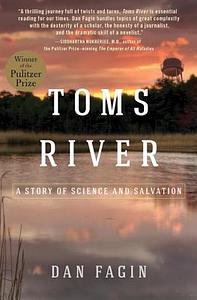You need to sign in or sign up before continuing.
Take a photo of a barcode or cover
This book was sort of a sequel to A Civil Action in that Toms River was a sequel to Woburn, MA. Yet another polluted community suffering from childhood cancers which has a heck of a time proving they were due to the pollution. Coming from the occupational side where epidemiological studies are difficult enough, the non-occupational cancer cluster studies are practically impossible to prove. Here about $10 million was spent on studies to reach a weak conclusion that wasn't very satisfying. The chemical companies got away with 4o years of polluting and profits. Yes, they had to clean up their mess and pay a large settlement but somehow that isn't enough retribution. It was sad to see how incredibly difficult environmental epidemiology is. The book's coda shows how this problem has moved to China. Not very hopeful or encouraging, but an important contribution to the history of public health.
An interesting story/analysis. I think that it was a bit long/overly detailed but the in depth look at cancer clusters and how the legal system and scientific community are challenged in trying to deal with the situation was interesting.
Filled with historical research predating when the Toms River incidence occurred, there is almost too much information to take in. This book definitely makes you wonder if business will ever put the good of society ahead of profits and market dominance, and how much we are willing to "pay" in order to share in that world.
informative
sad
medium-paced
Really close to 4 stars and I give Fagin props for making the science very accessible. Just a LOT of digressions from the main story
challenging
emotional
informative
reflective
sad
medium-paced
I've been recommending this book to others virtually since I started reading it! It is very well written and informative. I learned so much about epidemiology, cancer cluster studies, and chemical waste contamination issues!
I read this book for an environmental science course in grad school (and, to be honest, I probably would have enjoyed it more if I hadn't had to write a paper on it), but even with that it was a very good read with a compelling through line and characters.
Fascinating history that reads almost like a mystery novel in a very good way. I would recommend to most readers, as long as you have an interest in the science/history aspect of it.
Fascinating history that reads almost like a mystery novel in a very good way. I would recommend to most readers, as long as you have an interest in the science/history aspect of it.
This book is the Pulitzer prize winner for nonfiction back in 2014, and it is a well deserved read. The story is about the New Jersey town of Tom's River, which allowed a chemical company to build and operate a chemical plant in their town back in the 1960's. Unbeknownst to most residents, the chemical plant was dumping their toxic wastes into the ground and the river, which wound up leeching into the town's drinking water and poisoning many people over the course of years and years, leading to birth defects and extraordinary cancer rates. The author, Dan Fagin, takes this topic and explains what happened and when, and how the people dealt with the after-effects of being poisoned. He writes deftly about complicated issues such as chemical processes, water cycles, epidemiology and statistics in such a way that any reader can understand it without needing an advanced science degree. He also writes so that he is not 'talking down' to the reader. I was pleasantly surprised at how readable and relatable this book is.
Dan Fagin tells the story of Toms River, a New Jersey community that was home to some significant chemical production plants at a time when the understanding of what the waste products were and what they could do to the environment and people was far from understood. Add to this the lack of regulation, oversight, and the power of profit, then things do not go well. Fagin does a really good job of taking the reader through the complex world of chemical creation and production as well as the corporate giants that arose from it. He also manages to relay the complex science not just behind the chemicals themselves but behind the development of regulation and ultimately how hard it can be to prove causation and not just correlation. I liked how he interspersed the history of the chemical industry involved throughout the Toms River story, making those connections and links clearer and easier to follow (I'll be honest, I wasn't a fan at first but then I started seeing the benefit). This is a really hard and heavy book for many reasons, obviously the human side is devastating and the outcome not as satisfying as it would be in fiction (as a Welsh person, the damage done by external industry is an all too familiar story), but also the science side, which Fagin covers in as much detail to show how hard those involved worked to try and get some form of closure. But science doesn't bend to emotion and doesn't always give the answers that those driving it wants (or the data doesn't, those writing it might do the bending instead). This was a really educational and great read, I can't say I enjoyed it but I'm glad I read it. It is an important book, not just for Toms River and other New Jersey communities but all those places that have and are subject to industry, my home area of South Wales included.




